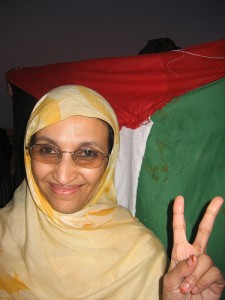Aminatou Haidar [2] is a leading activist for independence of the Western Sahara (from Morocco). Born in 1967, she was “disappeared” by Moroccan authorities for her activism at age twenty, only to reemerge three years later. In 2005, Haidar was arrested for her participation in a protest and sentenced to seven months in prison for “inciting violent protest activities.” Amnesty International deemed [3] her a prisoner of conscience, questioning the fairness of her trial and those of 6 others. Since her release, she has been honored with the Robert F. Kennedy Human Rights Award [4], nominated [5]for a Nobel Peace Prize, and most recently awarded the Civil Courage Prize [6] in New York, all for her work defending human rights in the Western Sahara.
Regardless of the accolades given to her, Haidar lived – until recently – in Morocco with great fear of being arrested; that is until Friday, November 13 when, upon returning to Laayoune (a city in the Western Sahara region), she was arrested and subsequently deported. According to [7] the Christian Science Monitor, authorities took issue with her writing “Western Sahara” on her customs forms. According to Moroccan officials, Haidar renounced and “willingly signed away” her Moroccan citizenship. She was then sent to Lanzarote in the Canary Islands, and later granted Spanish residency on humanitarian grounds, according to Spanish news organization ABC [8].
Pro-independence blog Sandblast reminds [9] readers that Haidar is not the only dissident persecuted for her cause, stating:
Since October 6, fifteen well-known human rights defenders from Western Sahara have been arrested, detained and interrogated. Seven of them, known as the Casablanca 7 are being tried in a military court for acts of treason after visiting their relatives in the Saharawi refugee camps in SW Algeria. These Saharawis have been targeted for speaking out against the repression of the Moroccan occupation in their homeland and advocating their self-determination rights as recognized by the UN charter and over a 100 UN resolutions. In August, the Moroccan authorities prevented six Saharawi youths from traveling to the UK to participate in the Oxford-based programme Talk Together, which promote dialogue between youth in areas of conflict.
Spanish blogger Bilbaobilonia, referencing a recent speech in which Moroccan King Mohammed VI stated that anyone supporting the Sahara's independence is a traitor, expressed support [10] [es] of Haidar:
Ya lo dijo el rey Mohamed VI en su discurso conmemorativo de la Marcha Verde [11]: en Marruecos sólo se puede ser patriota o traidor. Claro que, si alguien se toma la molestia de examinar las raquíticas libertades que promueve la dinastía alauí o la persecución a la que somete a la disidencia saharaui [12] , es fácil llegar a la conclusión de que en Marruecos, la traición es la forma más noble de patriotismo.
Blogger One Hump or Two expresses surprise [13] at the fact that Moroccan authorities would go after someone so well-connected:
This shows Moroccan police will go after any Sahrawi who supports a referendum, even those with international connections and support. Haidar's awards (most recently the Civil Courage Prize [14]) weresupposed to place her outside these dangers by showing the Moroccan government the world is watching them.
Sahara Occidental continues to post media roundups [15] on Aminatou Haidar's case.
